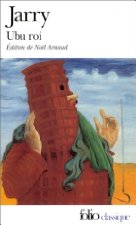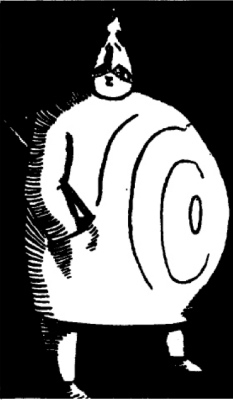
Like most of the participants in Ubu Week, I am at a bit of a loss when it comes to actually writing about Alfred Jarry's aggressively odd contribution to French theatre. Having only read the first play in the series, Ubu roi (which I understand is not the best), I am left with an impression of frat-boy humor that is somehow also a revolutionary step toward surrealism; a piece that invites comparison to everything from Shakespeare's Falstaff, to Monty Python's exploding man sketch, to some kind of appalling reality show on competitive cannibalism or something. ("Next, on FOX...") Seriously, what to say?
Regular readers may remember that I'm slowly and very casually compiling a reading list around the literary treatment of disgust and the disgusting, and this is probably the angle from which Ubu roi most interests me. Its main character and raison d'être, Père Ubu, is viscerally disgusting both morally and physically, and indeed eliciting shock and disgust, and expressing Jarry's own disgust with certain personality types and social assumptions, seems to have been a major goal of the plays to begin with. As such, they're a great jumping-off point for a catalog of possible sources of literary revulsion.
So, what's so disgusting about Père Ubu? His physical form, famously obese and with a head and face distorted to the point of inhumanity, makes a good start. The costume suggested by Jarry even includes a mask, which further separates Père Ubu from the world of the human.
From Dorian Grey's portrait to Lord Voldemort's snake face, it's always tempting to make a morally repugnant character physically repulsive as well, and even before Ubus père and mère become splattered with brains, they are a pretty repellent pair. (I question whether a production staged with marionettes, as this one sometimes has been, could achieve quite the levels of disgust possible for flesh-and-blood actors, although the puppets would add an extra level of inhumanity.) Père Ubu looks like the grotesque embodiment of id that his actions quickly prove him to be, with a giant spiral marking his insatiable stomach or "gidouille," the pit into which more or less anything is liable to vanish, and the before-mentioned mask obscuring his facial expressions just as the monotone voice which Jarry recommended for him, would mask vocal intonation.
Père Ubu's physical form, then, combines at least three modalities of disgust: the disgusting-as-distorted-or-out-of-place (the mask, the grotesque proportions); the disgusting-as-corporeal (his messiness and fatness; the references to his various orifices); and, in seeming contradiction to the second, the disgusting-as-void, a modality which might even verge on the eerie or frightening, rather than the disgusting. Anything can be subsumed into Père Ubu's gidouille, and while it's certainly disgusting to think of ingesting human flesh, for example, it's also horrifying to think of being eaten and thereby eliminated, assimilated by another. I think it's the combination of all three modalities that makes for a true coup de dégoût: Père Ubu combines the monstrous and bestial with the undeniably and uncomfortably human in a way that can't fail to repulse.
The speech and actions of the Ubus, of course, only reinforce this triple threat of repugnance. From the famous first word ("Merdre," a verbing of the French word "merde" or "shit"), the couple's odd coinages continue the theme of distortion and the out-of-place while at the same time making words and ideas that were already obscene, even grosser and messier. At the same time, Père Ubu's behavior takes the corporeal aspect of disgust to new levels: before a dinner party, for example, he gorges himself on the food laid out for the guests, then sits in a corner groaning about how fat and full he is, before proceeding to poison the food that all his guests are eating. The disgust of satiety is well represented in this scene: not only are we confronted with someone who has stuffed themselves to bursting before the meal even begins, but Mère Ubu's menu is comically large (thinking of eating so much food is disgusting), and features such delicacies as choux-fleurs à la merdre, or cauliflower à la shitting (thinking of eating this is disgusting all by itself). Add to the ideas of surfeit and coprophagia the body's reaction to having consumed poison, as well as Père Ubu's frequent threats to eat Mère Ubu, and you get a very disgusting scene indeed.
Interestingly, the most morally reprehensible actions in the play are the ones I, at least, found least viscerally disgusting. The murder of the Polish king, for example, is not particularly played for the gross-out. Nor is the scene (which I found to be one of the funniest in the play) when Père Ubu and his two lackies are attacked by a bear, and Père Ubu lets the lackies kill the beast while cowering in a corner—later telling them, in a very Falstaffian move, that
Vous pouvez vous flatter que si vous êtes encore vivants et si vous foulez encore la neige de Lithuanie, vous le devez à la vertue magnanime du Maître des Finances, qui s'est évertué, échiné et égosillé à débiter des patenôtres pour votre salut, et qui a manié avec autant de courage le glaive spirituel de la prière que vous avez manié avec adresse le temporel de l'ici présent Palotin Cotice coup-de-poing explosif.
You can flatter yourselves that if you're still alive to tread the snow of Lituania, you owe it to the magnanimous virtue of the Master of Finances [Père Ubu himself], who strove with great effort, yelling at the top of his voice, to discharge Pater Nosters for your health, and who handled with such courage the spiritual sword of prayer while you took on the here-present temporal weapon of the Knight Errant's explosive fist-punches.
This, and the seemingly random and jubilant execution of the nobles (the moral vacuum of which scene Amateur Reader addresses here), are the scenes that perhaps should disgust us the most—in the scene of cowardice, even Père Ubu's lackey calls him a revolting swine. But at least for me, they're not the most disgusting, which is an interesting commentary. Our perceptions of moral and physical disgust are so intertwined (often, of course, mistakenly, although not in the case of Ubu roi—this is an aspect of the play that's not particularly subversive), that it's easy to believe that a character who looks and speaks like Père Ubu will act in a cowardly, cruel way. What one does not expect, however jaded one might be, are threats of debraining.
Perhaps, also, one needs a deep sense of a victim's humanity before one is able to feel deeply disgusted by moral flaws like cruelty and cowardice. This is the point of those human-interest stories highlighting individuals who, for example, lost their retirement savings due to the greed of Enron executives, or their homes as a result of speculation on the housing market. Moral outrages tend to sicken only when embodied, when we can see the concrete pain that has been caused. Since all characters in the Ubu plays are broad, satirical sketches, not intended as real-seeming humans, and since Père Ubu's more reaching atrocities tend to be oddly uncoupled from the extreme embodiment found in the shit-eating, debraining, and cannibalism sections of the plays, said atrocities often achieve comedy and occasionally horror, but seem (especially by contrast) strangely devoid of disgust.
So. Are we all grossed out yet? One more note on disgust in Ubu roi: it interested me, especially given the prominence of the husband/wife duo, that sex-as-source-of-disgust doesn't really feature in this play. Those who have read the next in the cycle, Ubu cocu, can tell me: does it feature in that one? For a work that seems methodically to hit all the major categories of disgust, it seems a glaring omission, especially since Père Ubu's void-like gidouille functions like a kind of ungendered vagina dentata: the monstrous and amoral body part that will consume whatever comes into contact with it.
And with that, my friends, I'm off to take a shower and brush my teeth. Thoroughly. Several times.
I read Ubu roi as part of Nicole and Amateur Reader's Ubu Week, which sadly ended several weeks ago. Sorry to be late to the party, you crazy kids.
Also, translations above are mine but probably not as good as the ones by Cyril Connelly and David Ball that are available in the market for ready money.


